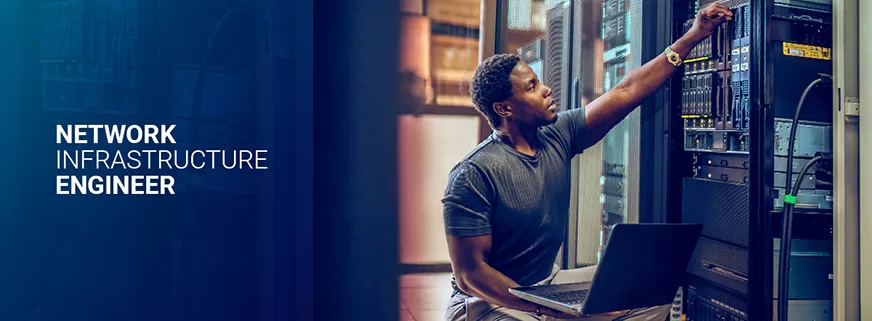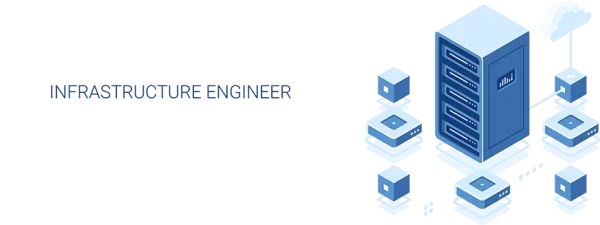We Help You Hire an Infrastructure Engineer From South America
Your next project can often be stressful and time-consuming if you cannot find the right nearshore company to hire with. Smart, responsible, hardworking, and experienced Infrastructure Engineers that are ideal candidates for your role.
Our AI matching algorithm helps your organization find the ideal development partner for your project. The method we use to match an Infrastructure Engineer your team is a combination of data and personal interviews.
We are dedicated to helping you hire Infrastructure Engineers who will contribute quality code right from the start. This is why we have refined our hiring processes over the past several years and have become a trusted partner for many startups that are growing rapidly. Add an expert to your team with OPSPROS and hire your future Infrastructure Engineer.
Work to US Time
Our Infrastructure Engineers work US hours and are happy to communicate with your existing team so they can gel with them.
Brazilian Rates
Our team is made up of talented and experienced Infrastructure Engineers from Brazil who are eager to work with US companies.
No Employment Tax
Benefits, local employment taxes, and other employment-related expenses are handled by our company.
Tested Infrastructure Engineers
It ensures your hiring a skilled professional who has passed our testing process when you hire a Infrastructure engineer from us.
Testimonials



Why Do You Need An Infrastructure Engineer?

An Infrastructure Engineer plays a crucial role in managing and maintaining the technological infrastructure of an organization. Here’s why you need an Infrastructure Engineer.
Designing and Building Infrastructure
An Infrastructure Engineer designs and builds the foundation of the organization’s technology infrastructure. They assess requirements, plan network architecture, and implement hardware and software solutions to meet business needs.
System Administration and Maintenance
Infrastructure Engineers oversee system administration tasks, ensuring the proper configuration, optimization, and maintenance of servers, networks, and storage systems. They monitor performance, troubleshoot issues, and ensure system reliability and availability.
Security and Compliance
Infrastructure Engineers focus on implementing and maintaining security measures to safeguard infrastructure and data. They assess risks, develop security policies, implement access controls, and ensure compliance with industry standards and regulations.
Scalability and Growth
Infrastructure Engineers plan for scalability and growth, ensuring the infrastructure can accommodate increased demands. They assess capacity requirements, implement scaling strategies, and integrate new technologies to support business growth.
Hiring an Infrastructure Engineer is essential for designing, building, and maintaining a secure, reliable, and scalable technology infrastructure. Their expertise in infrastructure design, system administration, security, and scalability ensures efficient operations, reduces downtime, enhances data protection, and supports the organization’s growth and success.

Difference between an Infrastructure Engineer and DevOps Engineer
Both Infrastructure Engineers and DevOps Engineers play critical roles in managing and maintaining technology infrastructure, but their focus and responsibilities differ.
Infrastructure Engineer
An Infrastructure Engineer specializes in designing, building, and maintaining the technological infrastructure of an organization. They focus on hardware, network architecture, system administration, and security. Their primary goal is to ensure a reliable and secure foundation for applications and systems.
DevOps Engineer
A DevOps Engineer, on the other hand, focuses on the integration of development and operations. They bridge the gap between software development and IT operations, emphasizing collaboration, automation, and continuous delivery. Their responsibilities include configuring and managing CI/CD pipelines, implementing infrastructure as code, and automating deployment and monitoring processes.
Distinguishing Factors
While Infrastructure Engineers primarily focus on the underlying infrastructure and its reliability, DevOps Engineers emphasize collaboration, automation, and efficient software delivery. DevOps Engineers have a broader scope, involving not only infrastructure management but also software development practices and tools. Both roles are essential for a successful and efficient technology ecosystem.
- Faster Time-to-Market
- Improved Infrastructure Management
- Enhanced Quality and Stability
- Increased Scalability
- Reduced Downtime
- Continuous Improvement
- Cost Efficiency
- Increased Customer Satisfaction

PEDRO ALVES
Infrastructure Engineer
9+ Years of Infrastructure engineering 8+ Years of Linux Admin. Has worked on both AWS and Azure

LUIZ FERREIRA
Infrastructure Engineer
11+ Years of Infrastructure 8+ Security He enjoys working on both Local and Cloud Infrastructure

JOÃO RODRIGUES
Infrastructure Engineer
7+ Years of DevOps 5+ Infrastructure Engineer. Experienced Infrastructure Engineer.
What does an Infrastructure Engineer do?
An Infrastructure Engineer plays a crucial role in designing, building, and maintaining the technological infrastructure of an organization. They ensure a reliable, secure, and scalable foundation for systems and applications. Here’s what an Infrastructure Engineer does:
Infrastructure Design and Planning
Infrastructure Engineers assess requirements, collaborate with stakeholders, and design network architecture and system configurations. They consider scalability, performance, and security in their designs.
System Implementation and Configuration
Infrastructure Engineers implement and configure hardware and software systems, including servers, networks, storage, and virtualization technologies. They ensure proper installation, integration, and optimization of infrastructure components.
Security and Compliance
Infrastructure Engineers implement security measures, such as access controls, encryption, and vulnerability management, to protect infrastructure and data. They ensure compliance with industry standards and regulations.
All in all Infrastructure Engineers
Infrastructure Engineers are responsible for designing, implementing, and maintaining the technology infrastructure. Their expertise in infrastructure design, configuration, monitoring, and security ensures a robust and efficient foundation for organizational operations.


We Are A Solid Development Operations Partner
OpsPros understands the importance of working with a reliable partner. As a result, we provide a premium and professional service to all our clients. Get in touch with us now to start your Infrastructure team!
How do you Hire an Infrastructure Engineer?
Follow these three steps to hire an Infrastructure Engineer:
Please click on the button below and click send on the form once you’ve written a description of your project and needs.
Interview Infrastructure Engineers based on their resumes. Start shortlisting professionals you want to interview once proposals start coming in.
When you write your requirement description, you determine the scope of your work and the type of Infrastructure Engineer you need
In order to receive a fast and detailed response, please include the following information:
Detailed deliverables: From websites to APIs and big data analytics, list them all.
Identify whether the project is small or large in your job posting.
Let us know if you prefer experience with certain industries, software.
Billing: Please indicate your preference for hourly rates versus priced monthly contracts.
How much does it cost to Hire an Infrastructure Engineer?
Several factors affect cost, including expertise, experience, market conditions, and location.
Additionally, an experienced Infrastructure Engineer will provide higher-quality results, work faster, and have more specialized knowledge.
Once they gain experience, beginners might be able to price their services higher.
Below are the rates for hiring our South American Infrastructure Engineers
Junior
Prices From- Works to U.S time zones
- No Recruitment Fees
- Vetted Skills & Experience
- Fulltime Working for you
- No Unreliable Freelancers
Intermediate
Prices From- Works to U.S time zones
- No Recruitment Fees
- Vetted Skills & Experience
- Fulltime Working for you
- No Unreliable Freelancers
Senior
Prices From- Works to U.S time zones
- No Recruitment Fees
- Vetted Skills & Experience
- Fulltime Working for you
- No Unreliable Freelancers
We have Infrastructure Engineers in South America available for hire!
Depending on the exact skill requirements and experience requirements, the price of Engineers may vary slightly.
Depending on your project, you’ll need to determine which is right for you.
Do Infrastructure Engineers write code?
Infrastructure Engineers primarily focus on designing, building, and maintaining the technological infrastructure of an organization. While they may not write extensive application code, they often utilize scripting and automation to enhance their work. Here’s an example in Python:
Infrastructure Automation Scripting Infrastructure Engineers can write Python scripts to automate various infrastructure-related tasks. For instance, they may develop a script using the popular Python automation framework, such as Ansible or Fabric, to automate server provisioning and configuration.
import paramiko
def provision_server(hostname, username, password):
client = paramiko.SSHClient()
client.set_missing_host_key_policy(paramiko.AutoAddPolicy())
client.connect(hostname, username=username, password=password)
# Execute commands for server provisioning
commands = [
"sudo apt-get update",
"sudo apt-get install -y nginx",
"sudo systemctl enable nginx",
"sudo systemctl start nginx"
]
for command in commands:
stdin, stdout, stderr = client.exec_command(command)
print(stdout.read().decode())
client.close()
# Usage example
provision_server('server1.example.com', 'admin', 'password')
Interview Questions to ask an Infrastructure Engineer
Can you describe your experience with designing and implementing network architecture for a complex infrastructure?
This question assesses the candidate’s ability to design scalable and secure network infrastructures. Look for their understanding of routing protocols, network segmentation, load balancing, and security measures.
How do you ensure high availability and disaster recovery in an infrastructure setup?
This question evaluates the candidate’s knowledge of strategies for ensuring system availability and resilience. Look for their understanding of redundancy, failover mechanisms, backup solutions, and disaster recovery planning.

Can you explain your approach to ensuring infrastructure security and compliance?
This question assesses the candidate’s understanding of security best practices and compliance frameworks. Look for their knowledge of access controls, encryption, vulnerability management, and their ability to implement security measures.

Do you enjoy Working Alone or within a Team?
There is no right or wrong answer to this question since Infrastructure engineers can have any combination of skills. Having an engineer who is hardworking and independent may be important to you. You might prefer someone who works well with others and isn’t stubborn.
How do you approach scalability and performance optimization in infrastructure design?
This question evaluates the candidate’s ability to design scalable and high-performance infrastructures. Look for their knowledge of capacity planning, resource optimization, monitoring, and their ability to identify and resolve performance bottlenecks.
A Brief History of Infrastructure Engineering
Infrastructure engineering has evolved significantly over time to meet the growing demands of technological advancements and organizational needs. Here’s a brief history of infrastructure engineering:
Early Infrastructure Development
Infrastructure engineering traces its roots to ancient civilizations, where early structures like roads, bridges, and aqueducts were built to enable trade, transportation, and water management.
Industrial Revolution
During the Industrial Revolution, infrastructure engineering played a pivotal role in the construction of railroads, canals, and telegraph networks, revolutionizing transportation and communication systems.
Modernization and Urbanization
With the advent of electricity, telecommunications, and modern transportation systems, infrastructure engineering expanded to encompass power grids, telecommunication networks, highways, and urban planning to support growing populations and urban development.
Technological Advancements
In recent decades, infrastructure engineering has embraced digital technologies, focusing on designing and maintaining complex IT infrastructure, data centers, network architecture, and cloud infrastructure.
The history of infrastructure engineering reflects the constant evolution driven by societal needs and technological advancements. From ancient civilizations to modern digital infrastructure, infrastructure engineering has played a vital role in shaping the built environment and enabling the efficient functioning of societies and organizations.
Why you should choose us to hire an Infrastructure Engineer from?
As a leading Nearshore Technology Solutions provider, we provide high-quality Infrastructure Engineers at reasonable prices. High-performance, scalable solutions are our goal for our clients. Throughout the project development phase and beyond, we strive to create long-term value.
Since 2014, we’ve matched skillful Infrastructure Engineers with great teams for over a hundred startups and tech companies worldwide.
You will find our Infrastructure Engineers to be devoted members of your team, fully integrating into your team’s operation.
Infrastructure Engineers that we hire undergo a thorough vetting process to ensure they have the necessary communication skills, remote work readiness, and technical skills (both for Infrastructure , development and cloud ).
Reduce Costs
In order to reduce costs, companies usually outsource. The cost of hiring software engineers outside the United States is lower. Additionally, you will be able to reduce overall employment costs significantly. There won’t be any US or European employment taxes, benefits, redundancy liabilities, or office space fees.
Ramp Up Faster
Taking advantage of growth and downsizing quickly can be a great competitive advantage for any industry. When you hire Brazilian Engineers through us, you will be able to scale up or down as needed, and do so relatively easily.
Trusted Partner
By outsourcing Infrastructure, you’re entrusting your project to a company with extensive experience helping businesses succeed. Thus, you can rest assured that your application will be delivered on schedule and within budget.
Why hire an Infrastructure Engineer?
Hiring an Infrastructure Engineer is essential for organizations seeking to establish and maintain a robust and reliable technological infrastructure. Here’s why you should consider hiring an Infrastructure Engineer:
Expertise in Infrastructure Design and Implementation
Infrastructure Engineers possess specialized knowledge in designing and implementing infrastructure solutions tailored to meet organizational needs. They ensure the infrastructure is scalable, secure, and optimized for performance.
Efficient System Management
Infrastructure Engineers excel in managing and maintaining system components such as servers, networks, and storage. They monitor performance, troubleshoot issues, and ensure system availability, reliability, and efficiency.
Enhanced Security and Compliance
Infrastructure Engineers prioritize security and compliance, implementing measures to protect infrastructure and sensitive data. They enforce access controls, implement encryption, and adhere to industry standards and regulations.
Scalability and Growth Planning
Infrastructure Engineers plan for scalability and growth, ensuring the infrastructure can accommodate increasing demands. They assess capacity requirements, implement scaling strategies, and integrate new technologies to support business growth.
Why hiring an Infrastructure Engineer could benefit your company
Hiring an Infrastructure Engineer brings expertise in infrastructure design, efficient system management, enhanced security, and scalability planning. They play a crucial role in establishing a reliable and future-proof infrastructure that supports organizational growth, performance, and security requirements.

- Continuous Integration and Deployment (CI/CD)
- Improved Automation
- Infrastructure as Code (IaC)
- Monitoring and Alerting
- Better Collaboration and Communication
- Improved Security and Compliance
How do we test an Infrastructure Engineer to check his skills?

Testing the skills of an Infrastructure Engineer is crucial to ensure their proficiency in designing, implementing, and managing a reliable technological infrastructure. Here’s how we assess their skills:
To test an Infrastructure Engineer’s skills, we conduct a practical assessment that presents real-world scenarios or problem-solving tasks. And we evaluate their ability to troubleshoot and resolve infrastructure-related challenges. Assign a hypothetical project to assess their capability in planning and designing infrastructure solutions aligned with scalability, security, and performance optimization.
Additionally, we evaluate their communication and collaboration skills by assessing their ability to effectively work with cross-functional teams and stakeholders. By employing these testing methods, we can evaluate an Infrastructure Engineer’s technical knowledge, problem-solving abilities, and capacity to collaborate effectively in an infrastructure management context.
How do you Integrate Infrastructure Engineers into your existing development team?
Integrating Infrastructure Engineers into an existing development team requires careful planning and effective collaboration. Here’s how to approach the integration:
Assess Current Team Structure and Processes:
Evaluate the current development team structure, processes, and workflows. Identify areas where Infrastructure engineering practices can bring the most value and align with the team’s goals and project requirements.
Define Roles and Responsibilities:
Clearly define the roles and responsibilities of Infrastructure Engineers within the development team. Determine how they will collaborate with developers, testers, and other stakeholders. Ensure everyone understands their respective roles and the value each role brings to the team.

Promote Cross-Functional Collaboration:
Encourage cross-functional collaboration between Infrastructure Engineers and other team members. Facilitate regular meetings, stand-ups, and knowledge-sharing sessions. Foster an environment where team members can learn from each other, exchange ideas, and work together to solve challenges.
Establish Continuous Integration and Deployment (CI/CD) Pipelines:
Implement CI/CD pipelines and automation practices that seamlessly integrate with the existing development workflow. Collaborate with Infrastructure Engineers to configure and optimize these pipelines, ensuring a smooth and efficient software delivery process.
Provide Training and Support:
Offer training and support to the development team to familiarize them with Infrastructure concepts, tools, and practices. Conduct workshops, provide documentation, and encourage skill-sharing sessions. This ensures that everyone understands the importance of Infrastructure and can actively contribute to its implementation.
Encourage a Culture of Continuous Improvement:
Promote a culture of continuous improvement and learning within the team. Encourage team members, including Infrastructure Engineers, to experiment, innovate, and propose process optimizations. Embrace feedback loops, retrospective discussions, and data-driven decision-making to drive continuous improvement.
Ready for Sucess
By following these steps, integration of Infrastructure Engineers into an existing development team can be done effectively, ensuring collaboration, streamlined processes, and successful adoption of DevOps practices throughout the software development lifecycle.

How long on average does an Infrastructure Engineer stay at a company?
Infrastructure Engineers in the US tend to stay between 1.4 and 3.3 years in their jobs, with larger companies keeping workers longer. On average, Brazilians spend between 1.9 and 4.1 years in the job, with Sao Paulo residents spending the shortest amount of time there. Previously, people tended to spend their entire careers with the same company.
Infrastructure Engineers with experience may depart from one job to another for new opportunities and more money, as such longevity is no longer the norm. The most in-demand Infrastructure pros can migrate between jobs (or even freelance) fairly easily in this market due to a low unemployment rate and a great need for professionals with deployment, cloud, and other important skills. We offer perks to attract and retain top talent, and we value communication with employees.

Frequently Asked Questions (FAQs)
Our services are trusted by hundreds of startups and tech companies worldwide, and we have matched hundreds of skilled Engineers to great development teams in the US, UK and Canada. Every Infrastructure Engineer in our network goes through a vetting process to verify their communication abilities, remote work readiness, and technical skills, both for depth in DevOps and breadth across the greater development and deployment domain.
The job description of an Infrastructure Engineer should include the following:
Deployment, implementing, and managing software
New program testing and evaluation
Enhancing existing programs by identifying areas for improvement
Scripting and Automation
Analyzing operational feasibility
Establishing procedures for quality assurance
Implementing software tools, processes, and metrics
Upgrades and maintenance of existing systems
Assisting other developers, UX designers, and business analysts with their tasks
It’s not enough to just ship features; your software needs to help your business succeed. In order to better understand what you’re building, for whom, and why, we’ll begin our collaboration with a discovery process.
Our headquarters are in Sao Paulo, Brazil. We have clients from all over the world. We have successfully collaborated with companies in North America, Asia, the Middle East, and Europe. A good understanding of each client and excellent English communication skills help the process run smoothly.
We can work with you to scale the team down as needed and make sure you have the correct skills required for each project phase.
All Types! You can hire an Infrastructure Engineer on a full-time, part-time, or contract-to-hire basis at OPSPROS. You can find an Infrastructure Engineer in a time zone that suits your needs thanks to our global network of skilled DevOps engineers. Engineers who work remotely for us are all mid- and senior-level professionals, ready to work right away.

